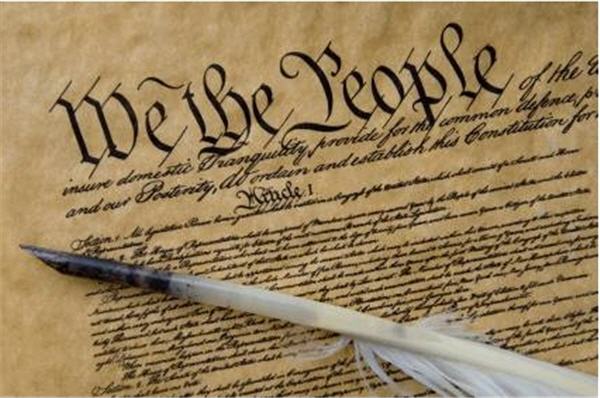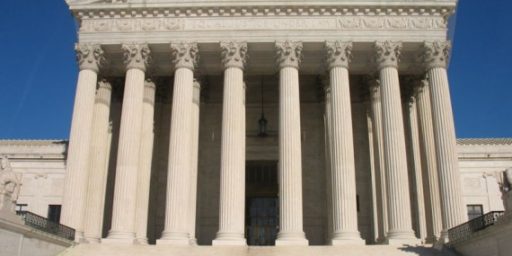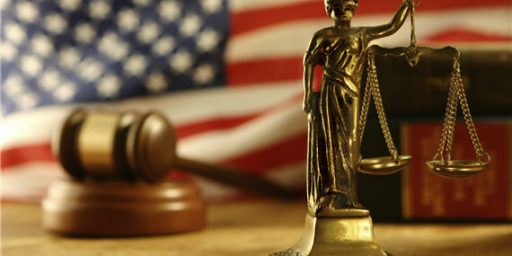A Question Regarding the Commerce Clause
 Rand Paul has elucidated a position held by many conservatives and libertarians: that the the main problem with the Civil Rights Act is that it takes an overly broad interpretation of the commerce clause of the US Constitution. Even some who think that the overall outcome was positive will argue that it was done the wrong way and that the cost associated with expanding the scope of the commerce clause was too high to pay.
Rand Paul has elucidated a position held by many conservatives and libertarians: that the the main problem with the Civil Rights Act is that it takes an overly broad interpretation of the commerce clause of the US Constitution. Even some who think that the overall outcome was positive will argue that it was done the wrong way and that the cost associated with expanding the scope of the commerce clause was too high to pay.
Without getting into that argument, or even what one thinks is the proper interpretation of the commerce clause, I am curious as to what everything thinks is the best example (or examples) of abuse of the commerce clause.






Two examples:
First Wickard v. Filburn — Supreme Court held that Congresses Commerce Clause power extended to regulating how much wheat a farmer could grow on his own farm, for his own use. The wheat in question never entered commerce, not to mention the fact that never entered interstate commerce. Widely seen as the beginning of a dramatic, and I would argue unjustified, expansion of the Commerce Clause.
Second, Gonzalez v. Raich — Held that Commerce Clause allows Feds to prosecute someone growing marijuana at home for use as medicinal Marijuana under California’s medical marijuana law.
But Wickard is the beginning of a dramatic expansion of state power. In fact, in the 68 years since Wickard, there’s only been one Supreme Court case that found that a Congressional assertion of Commerce Clause power was unconstitutional.
I would absolutely agree that Wickard v. Filburn is the A-Bomb of Commerce Clause jurisprudence, and I believe is one of the most egregious cases in the history of the Supreme Court. It was an open and ostentatious power grab for the federal government.
I remember one of the cases litigating this. The plaintiff said he had a restaurant that served food prepared from locally produced sources and thus was not involved in interstate commerce. In a foot note, one of the justices had a bit of snark asking where he got his coffee.
It is things like this that makes your request almost impossible Steven. I haven’t read the decision but I’m willing to make a bet that the reasoning goes like this:
The farmer is growing wheat for his own use. Said wheat wont enter the market, but because he is using the wheat himself, the farmer wont be buying wheat off the market that he otherwise would. As such, the “personal use wheat” does have an impact on the market and even in regards to inter-state commerce. Based on this the government can regulate the production of personal wheat.
I’ve joked before that technically the government has the power to regulate what people grow in their backyard gardens. They often think I’m kidding or not serious. Look at the above case, if the reasoning in the decision is indeed as I described it then yes, the government can regulate backyard gardens. Even your freaking flower beds. After all, if you get really into it and stop buying flowers, seeds and so forth from the local garden supply store that flower bed is impacting inter-state trade and can be subject to regulation.
In short, there is nothing that is outside the purview of the federal government under this view of the Commerce clause. Even if you want to be a hermit and live out in the middle of nowhere providing everything you need to live off of, that has an impact on interstate trade and therefore is subject to regulation by the federal government if they so choose to regulate it.
Steve, that is exactly the reasoning they use to prove that it was interstate commerce. But they also had to prove that it had a significant effect on interstate commerce. They then held that a lot of trivial transactions (or lack thereof in this case), taken in the aggregate of many similarly situated individuals, can have a significant effect on interstate commerce.
Wickard v. Filburn – the beginning of the end of our Constitutional Republic.
“The Agricultural Adjustment Act of 1938 limited the area that farmers could devote to wheat production.”
I think that’s when the horse really left the barn.
If you can get Scalia on your side, as happened in Gonzalez vs Raich, the game is pretty much over, I’d say.
Nthing Wickard. Doug nailed it out of the gate.
Sam,
Scalia is an originalist to a point, but more concerned with judicial restraint that overturning bad precedent. A fact he’s made clear many times in the past.
Steve V,
From Justice Thomas’s dissent in Raich:
Indeed.
“Even some who think that the overall outcome was positive will argue that it was done the wrong way”
What pray tell was the right way? Does anyone here believe that without governmental action, racism would have continued unabated for the foreseeable future? Is anyone seriously suggesting that the market would have stopped it, when it did not for generations?
“and that the cost associated with expanding the scope of the commerce clause was too high to pay.”
Spoken like someone who never had to pay any of the cost of decades of racism.
This shows a profound misunderstanding of history.
Jim Crow laws were instituted in the South precisely because white business were doing business with blacks despite social pressure. If that wasn’t the case, then why would there have had to been a law preventing Woolworth’s from having a lunch counter where blacks could sit with whites ?
I’d also suggest you refresh yourself of the facts in Plessy v. Ferguson. The law at issue in Plessy was enacted by Louisiana to prevent the Pullman Company from allowing blacks to purchase first-class train tickets.
It wasn’t the market that created 70 years of segregation in the South, it was the state
Steve Verdon writes:
That is the point isn’t it? This is one view of the commerce clause. Obviously one shared by some justices. Another view is that when the founders drafted a provision to regulate interstate commerce, they intended to prevent interstate tariffs and other overt anti-competitive behavior. The aggregate effect of non-interstate trade probably was not in their mind.
This view that EVERYTHING is interstate commerce because we can divine some tortured logic to make it so would seem to be in contrast with the basic nature of the original Constitution which seems to have gone out of its way to limit power, or specifically enumerate it.
I don’t disagree that under this view of the commerce clause, everything is interstate commerce. The question is whether this view is correct. I would argue no, it is just a way to rationalize Congress’ power grab.
I’m Hamiltonian and not to be trusted on these things, but I think the marijuana law cited by Doug is probably the most extreme use of the commerce clause. And just as extreme were the laws ruled unconstitutional (Violence Against Women Act and Gun-Free School Zones Act). All three are examples of the federal government exercising local police power with the apparent distinction that marijuana is commonly sold, like wheat, in interstate commerce.
It would be interesting to know what Paul and his supporters think of the Interstate Commerce Commission Act through which the interstate railways were desegregated. If this is just a constitutional point of order, then there surely couldn’t be an objection. But I sense a broader policy objection to government intervening in private affairs, so that Paul might not see it as unconstitutional, but still imprudent.
I’m with Doug on this. The two examples he cites leap out.
Doug,
I’m not the one misunderstanding history. To give you a clue, remember that Woolworth’s and Pullman were based in New York and Illinois, respectively. As outsiders, they would have been less subject to the social pressures which were needed to keep such laws in place.
@Doug
True enough. But in Raich, he relied on the Necessary and Proper Clause to support his concurrence:
He was with the majority in Lopez, which concluded that the issue in that case was not properly a matter falling under the purview of the Commerce Clause. But, in quote above he says, what I read as approvingly, ‘As Lopez itself states, and the Court affirms today, Congress may regulate noneconomic intrastate activities only where the failure to do so “could … undercut†its regulation of interstate commerce.’
I could be wrong, of course, but I don’t read any of that as indicating he thinks bad precedent is involved but he won’t vote to overturn.
Sam,
The passage you quote is classic Scalia. He is singularly brilliant at couching his decisions in scholarly (and obfuscatory) language that makes it seem as though there is a sound distinction between what he is ruling (that it is “necessary and proper” to the enforcement of interstate regulation for the government to raid an individual’s private demesne to confiscate a plant grown only for the use of that individual) and judicial overreach. When you take the time and the (great deal of) effort necessary to pull back the curtain, you realize that the wizard is just a results-oriented old man pulling the levers of federal power. As a writer, Scalia is such a genius that doing so is beyond the skills of most lawyers, let alone the general public.
You’ll never catch him saying that he is upholding bad precedent, but it is precisely what he does, time and time again.
Note that this is where I think many libertarian types, probably including Rand Paul, have an issue with the Civil Rights Act of 1964. While they like the ending of discrimination and segregation in public agencies, facilities, etc. The broader implications when applied to private businesses, even if they are good in the context of civil rights in the South at that time, may very well come at too high a cost. So while one can be in favor of the results and deplore racism and discrimination it is more of an argument about how you achieve that end.
I’m having a strong feeling of deja vu.
“It wasn’t the market that created 70 years of segregation in the South, it was the state”
It was the culture. Not all of Jim Crow and segregation was codified.
Steve
Doug, my first inclination when I read this was, “You weren’t there then, were you?”
Then I read this from Steve:
and I thought, “He has a point… but I’m not sure if he gets it.”
I know (and all of you do too) that lynchings weren’t “codified”, but under Jim Crow, they happened all too often. And the state looked the other way…
Because the “culture” wanted it to.
So what would be your solution, if not the CRA of ’64?
Oh I’m sure the vaunted Free Market would have fixed that, if only the darned government would have let it…
I can’t speak for Doug, but there is an alternative to the CRA as passed. I don’t have as much of an issue with it as others and consider it a major success, but there is an alternative:
1. Pass it without the commerce clause expansion.
2. Force the southern states, with troops if necessary, to enforce their own laws against murder, assault and the like without regard to race. The Justice Department could have entered into consent decrees with the states.
That solution is not quite as good as the CRA, but it would have solved much of the most violent aspects of the culture, such as vandalizing black-owned businesses, lynchings, etc.
Wickard was properly decided.
And so was Lopez.
Most of the delegates to the Constitutional Convention fought tooth and nail for Federal Supremacy. Hell, Alexander Hamilton’s plan was to abolish the states entirely. All over the Constitution, Federal powers are defined in vague terms while states are specifically proscribed from doing LOTS of things.
Most of the Founding Fathers wanted a strong, central, Federal government. Because the Constitution had to be approved by the states, the Federal powers were watered down, but only enough to allow for ratification.
Interesting read on this Alex. Some might even say “novel.” I’ve always heard that the Founders / Framers feared centralized government, hence a federalist system with checks and balances for the federal government.
What do “The Federalist Papers” have to say about this?
Myself, I’ve always been a Jefferson man; never cared much for Hamilton.
Alex seems to have gone full tilt Leviathian of late, to hell with federalism, limited government, and enumerated powers.
@Robert and Charles –
I just finished reading the Federalist Papers, Madison’s notes on the creation of the Constitution, and the debates on the Constitution. Most of those “Framers” who feared centralized government were those opposed to adopting the Constitution in the first place–not the people who adopted it.
The Federalist system that we have embodied in the Constitution was primarily the result of a compromise with the smaller states, who feared a loss of influence for their states under a more centralized system–not “oppression” by the Federal government.
The “Checks and Balances” argument is elucidated in Federalist No. 51, which makes no mention of any balance of power between state and federal governments whatsoever (indeed, it rather disparages state governments)–it refers to the separation of powers within the Federal sphere. Which are definitely a good thing. Indeed, I wish the Congress took its separation of powers more seriously on a wide variety of matters rather than being obsequious to the President, but that’s a discussion for another time.
@charles – I care about empirical results, not abstract theory. One cannot read a history of the Republic without noticing that the greatest abusers of power throughout America’s history are state and local governments. Which is not to say that the Feds are innocent–given the current Nobel Peace Prize Winner-in-Chiefs penchant for assassination of American citizens, that would be impossible. But the Federal government tends to be better and less oppressive than the states.
Additionally, I might add, I do believe in limited government and enumerated powers. I do believe that these are compatible with a strong, central government. However, given the history of jurisprudence on the commerce clause, I agree with the Supreme Court on both Wickard and on Lopez–commerce does include Wickard’s farm, but not areas of purely criminal activity. I might also add that I agree with the holding in Wickard, but vehemently disagree with the law that was upheld.
As should be easy to notice, I decided to post a response to Alex and Robert (after a fashion) as a new post.
Dan gets this one right. The laws were there to force outsiders to follow the rules that virtually all of the locals followed and would continue to follow with or without Jim Crow and some continued to follow despite the CRA.
I take it you haven’t spent much time in the South and particularly not in the South 20+ years ago.
Alex,
I should have been more clear in distinguishing between the federal checks and the states. We differ on the extent that the commerce clause should be applied. It made sense for civil rights, especially given the particulars of the situation, but it is absurd to use it to the extent that it is now. If they can define anything as commerce, they can use the commerce clause for anything.
Incidentally, when I asked about what the Federalist Papers said, I was being sincere.
Alex,
Also, I should, the checks and balances do have the effect of weakening the federal government. A bicameral legislature alone is a huge deal and so is the presidential veto. Court review of laws can also be a limiting factor, but when the courts do things like allow the commerce clause to apply to people growing their own wheat, that doesn’t have much of a limiting effect.